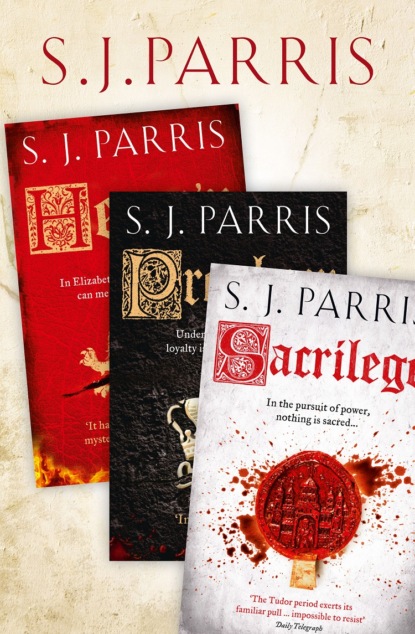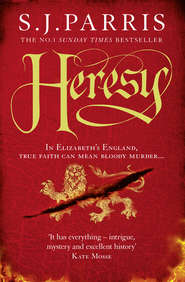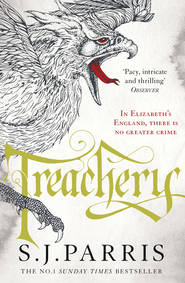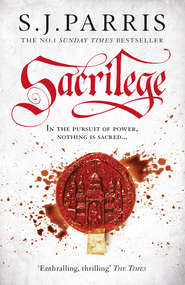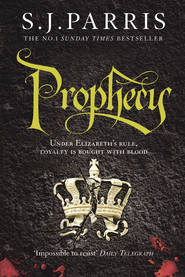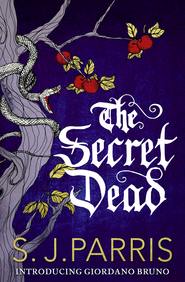По всем вопросам обращайтесь на: info@litportal.ru
(©) 2003-2024.
✖
Giordano Bruno Thriller Series Books 1-3: Heresy, Prophecy, Sacrilege
Автор
Год написания книги
2019
Настройки чтения
Размер шрифта
Высота строк
Поля
‘Something I ate, Padre,’ I said, and with deep regret, I threw the book into the hole, producing a noisy coughing fit to cover the splash it made as it fell into the pool of waste below. It had been such a fine edition, too.
I unlatched the door and opened it to see my abbot standing there, his heavy features almost vibrating with pent-up rage, all the more vivid in the gusting light of the torches carried by the four monks who stood behind him, staring at me, appalled and fascinated.
‘Do not move, Fra Giordano,’ Vita said tightly, jabbing a warning finger in my face. ‘It is too late for hiding.’
He strode into the cubicle, his nose wrinkled against the stench, holding up his lamp to check each of the corners in turn. Finding nothing, he turned to the men behind him.
‘Search him,’ he barked.
My brothers looked at one another in consternation, then that wily Tuscan friar Fra Agostino da Montalcino stepped forward, an unpleasant smile on his face. He had never liked me, but his dislike had turned to open animosity after I publicly bested him in an argument about the Arian heresy some months earlier, after which he had gone about whispering that I denied the divinity of Christ. Without a doubt, it was he who had put Fra Vita on my trail.
‘Excuse me, Fra Giordano,’ he mouthed with a sneer, before he began patting me up and down, his hands roaming first around my waist and down each of my thighs.
‘Try not to enjoy yourself too much,’ I muttered.
‘Just obeying my superior,’ he replied. When he had finished groping, he rose to face Fra Vita, clearly disappointed. ‘He has nothing concealed in his habit, Father.’
Fra Vita stepped closer and glared at me for some moments without speaking, his face so near to mine that I could count the bristles on his nose and smell the rank onions on his breath.
‘The sin of our first father was the desire for forbidden knowledge.’ He enunciated each word carefully, running his tongue wetly over his lips. ‘He thought he could become like God. And this is your sin also, Fra Giordano Bruno. You are one of the most gifted young men I have encountered in all my years at San Domenico Maggiore, but your curiosity and your pride in your own cleverness prevent you from using your gifts to the glory of the Church. It is time the Father Inquisitor took the measure of you.’
‘No, Padre, please – I have done nothing—’ I protested as he turned to leave, but just then Montalcino called out from behind me.
‘Fra Vita! Here is something you should see!’
He was shining his torch into the hole of the privy, an expression of malevolent delight spreading over his thin face.
Vita blanched, but leaned in to see what the Tuscan had uncovered. Apparently satisfied, he turned to me.
‘Fra Giordano – return to your cell and do not leave until I send you further instructions. This requires the immediate attention of the Father Inquisitor. Fra Montalcino – retrieve that book. We will know what heresies and necromancy our brother studies in here with a devotion I have never seen him apply to the Holy Scriptures.’
Montalcino looked from the abbot to me in horror. I had been in the privy for so long I had grown used to the stink, but the idea of plunging my hand into the pool beneath the plank made my stomach rise. I beamed at Montalcino.
‘I, my Lord Abbot?’ he asked, his voice rising.
‘You, Brother – and be quick about it.’ Fra Vita pulled his cloak closer around him against the chill night air.
‘I can save you the trouble,’ I said. ‘It is only Erasmus’s Commentaries – no dark magic in there.’
‘The works of Erasmus are on the Inquisition’s Index of Forbidden Books, as you well know, Brother Giordano,’ Vita said grimly. He fixed me again with those emotionless eyes. ‘But we will see for ourselves. You have played us for fools too long. It is time the purity of your faith was tested. Fra Battista!’ he called to another of the monks bearing torches, who leaned in attentively. ‘Send word for the Father Inquisitor.’
I could have dropped to my knees then and pleaded for clemency, but there would have been no dignity in begging, and Fra Vita was a man who liked the order of due process. If he had determined I should face the Father Inquisitor, perhaps as an example to my brethren, then he would not be swayed from that course until it had been played out in full – and I feared I knew what that meant. I pulled my cowl over my head and followed the abbot and his attendants out, pausing only to cast a last glance at Montalcino as he rolled up the sleeve of his habit and prepared to fish for my lost Erasmus.
‘On the bright side, Brother, you are fortunate,’ I said, with a parting wink. ‘My shit really does smell sweeter than everyone else’s.’
He looked up, his mouth twisted with either bitterness or disgust.
‘See if your wit survives when you have a burning poker in your arsehole, Bruno,’ he said, with a marked lack of Christian charity.
Outside in the cloister, the night air of Naples was crisp and I watched my breath cloud around me, grateful to be out of the confines of the privy. On all sides the vast stone walls of the monastic buildings rose around me, the cloister swallowed up in their shadows. The great façade of the basilica loomed to my left as I walked with leaden steps towards the monks’ dormitory, and I craned my head upwards to see the stars scattered above it. The Church taught, after Aristotle, that the stars were fixed in the eighth sphere beyond the earth, that they were all equidistant and moved together in orbit about the Earth, like the Sun and the six planets in their respective spheres. Then there were those, like the Pole Copernicus, who dared to imagine the universe in a different form, with the Sun at its centre and an Earth that moved on its own orbit. Beyond this, no one had ventured, not even in imagination: no one but me, Giordano Bruno the Nolan, and this secret theory, bolder than anyone had yet dared to formulate, was known to me alone: that the universe had no fixed centre, but was infinite, and each of those stars I now watched pulsating in the velvet blackness above me was its own sun, surrounded by its own innumerable worlds, on which, even now, beings just like me might also be watching the heavens, wondering if anything existed beyond the limits of their knowledge.
One day I would write all this in a book that would be my life’s work, a book that would send such ripples through Christendom as Copernicus’s De Revolutionibus Orbium Coelestium had done, but greater still, a book that would undo all the certainties not only of the Roman Church but of the whole Christian religion. But there was so much more that I needed to understand, too many books I had yet to read, books of astrology and ancient magic, all of which were forbidden by the Dominican order and which I could never obtain from the library at San Domenico Maggiore. I knew that if I were to stand before the Holy Roman Inquisition now, all of this would be pricked out of me with white-hot irons, with the rack or the wheel, until I vomited my hypothesis out half cooked, whereupon they would burn me for heresy. I was twenty-eight years old; I did not want to die just yet. I had no choice but to run.
It was then just after compline; the monks of San Domenico were preparing to retire for the night. Bursting into the cell I shared with Fra Paolo of Rimini, trailing the cold of the night on my hair and habit, I rushed frantically about the tiny room, gathering what few belongings I had into an oilskin bag. Paolo had been lying in contemplation on his straw pallet when I flung the door open; now he propped himself up on one elbow, watching my frenzy with concern. He and I had joined the monastery together as novices at the age of fifteen; now, thirteen years later, he was the only one I thought of as a brother in the true sense.
‘They have sent for the Father Inquisitor,’ I explained, catching my breath. ‘There is no time to lose.’
‘You missed compline again. I told you, Bruno,’ Paolo said, shaking his head. ‘If you spend so many hours in the privy every night, people will grow suspicious. Fra Tomasso has been telling everyone you have some grievous disease of the bowel – I said it would not take long for Montalcino to deduce your true business and alert the abbot.’
‘It was only Erasmus, for Christ’s sake,’ I said, irritated. ‘I must leave tonight, Paolo, before I am questioned. Have you seen my winter cloak?’
Paolo’s face was suddenly grave.
‘Bruno, you know a Dominican may not abandon his order, on pain of excommunication. If you run away, they will take it as a confession, they will put out a warrant for you. You will be condemned as a heretic.’
‘And if I stay I will be condemned as a heretic,’ I said. ‘It will hurt less in absentia.’
‘But where will you go? How will you live?’ My friend looked pained; I stopped my searching and laid my hand on his shoulder.
‘I will travel at night, I will sing and dance or beg for bread if I have to, and when I have put enough distance between myself and Naples, I will teach for a living. I took my Doctor of Theology last year – there are plenty of universities in Italy.’ I tried to sound cheerful, but in truth my heart was pounding and my bowels were turned to water; it was somewhat ironic that I could not now go near the privy.
‘You will never be safe in Italy if the Inquisition name you as a heretic,’ Paolo said sadly. ‘They will not rest until they see you burned.’
‘Then I must get out before they have the chance. Perhaps I will go to France.’
I turned away to look for my cloak. There flashed into my memory, as clear as the day it was first imprinted, the image of a man consumed by fire, his head twisted back in agony as he tried in vain to turn his face from the heat of the flames that tore hungrily at his clothes. It was that human, fruitless gesture that stayed with me in the years afterwards – that movement to protect his face from the fire, though his head was bound to a stake – and since then I had deliberately avoided the spectacle of another burning. I had been twelve years old, and my father, a professional soldier and a man of orthodox and sincere belief, had taken me to Rome to watch a public execution for my edification and instruction. We had secured a good vantage point for ourselves in the Campo dei Fiori towards the back of the jostling crowd, and I had been amazed at how many had gathered to make profit from the event as if it were a bear-baiting or a fair: sellers of pamphlets, mendicant friars, men and women peddling bread and cakes or fried fish from trays around their necks. Neither had I expected the cruelty of the crowd, who mocked the prisoner with insults, spitting and throwing stones at him as he was led silently to the stake, his head bowed. I wondered if his silence were defeat or dignity, but my father explained that an iron spike had been driven through his tongue so that he could not try to convert the spectators by repeating his foul heresies from the pyre.
He was tied to the stake and the faggots piled around him so that he was almost hidden from view. When a torch was held to the wood, there was an almighty crackling and the kindling caught light immediately and burned with a fierce glow. My father had nodded in approval; sometimes, he explained, if the authorities feel merciful, they allow green wood to be used for the pyre, so that the prisoner will often suffocate from the smoke before he truly suffers the sting of the flames. But for the worst kind of heretics – witches, sorcerers, blasphemers, Lutherans, the Benandanti – they would be sure the wood was dry as the slopes of Monte Cicala in summer, so that the heat of the flames would tear at the offender until he screamed out to God with his last breath in true repentance.
I wanted to look away as the flames rushed to devour the man’s face, but my father was planted solidly beside me, his gaze unflinching, as if watching the poor wretch’s agonies were an essential part of his own duty to God, and I did not want to appear less manly or less devout than he. I heard the mangled shrieks that escaped the condemned man’s torn mouth as his eyeballs popped, I heard the hiss and crackle as his skin shrivelled and peeled away and the bloody pulp beneath melted into the flames, I smelled the charred flesh that reminded me horribly of the boar that was always roasted over a pit at street festivals in Nola. Indeed, the cheering and exultation of the crowd when the heretic finally expired was like nothing so much as a saint’s day or public holiday. On the way home I asked my father why the man had had to die so horribly. Had he killed someone? My father told me that he had been a heretic. When I pressed him to explain what a heretic was, he said the man had defied the authority of the pope by denying the existence of Purgatory. So I learned that, in Italy, words and ideas are considered as dangerous as swords and arrows, and that a philosopher or a scientist needs as much courage as a soldier to speak his mind.
Somewhere in the dormitory building I heard a door slam violently.
‘They are coming,’ I whispered frantically to Paolo. ‘Where the devil is my cloak?’
‘Here.’ He handed me his own, pausing a moment to tuck it around my shoulders. ‘And take this.’ He pressed into my hand a small bone-handled dagger in a leather sheath. I looked at him in surprise. ‘It was a gift from my father,’ he whispered. ‘You will have more need of it than I, where you are going. And now, sbrigati. Hurry.’
The narrow window of our cell was just large enough for me to squeeze myself on to the ledge, one leg at a time. We were on the first floor of the building, but about six feet below the window the sloping roof of the lay brothers’ reredorter jutted out enough for me to land on if I judged the fall carefully; from there I could edge my way down a buttress and, assuming I could make it across the garden without being seen, I could climb the outside wall of the monastery and disappear into the streets of Naples under cover of darkness.
I tucked the dagger inside my habit, slung my oilskin pack over one shoulder and climbed to the ledge, pausing astride the window sill to look out. A gibbous moon hung, pale and swollen, over the city, smoky trails of cloud drifting across its face. Outside there was only silence. For a moment I felt suspended between two lives. I had been a monk for thirteen years; when I lifted my left leg through the window and dropped to the roof below I would be turning my back on that life for good. Paolo was right; I would be ex communicated for leaving my order, whatever other charges were levelled at me. He looked up at me, his face full of wordless grief, and reached for my hand. I leaned down to kiss his knuckles when I heard again the emphatic stride of many feet thundering down the passageway outside.
‘Dio sia con te,’ Paolo whispered, as I pulled myself through the small window and twisted my body around so that I was hanging by my fingertips, tearing my habit as I did so. Then, trusting to God and chance, I let go. As I landed clumsily on the roof below, I heard the sound of the little casement closing and hoped Paolo had been in time.
The moonlight was a blessing and a curse; I kept close to the shadows of the wall as I crossed the garden behind the monks’ quarters and, with the help of wild vines, I managed to pull myself over the far wall, the boundary of the monastery, where I dropped to the ground and rolled down a short slope to the road. Immediately I had to throw myself into the shadow of a doorway, trusting to the darkness to cover me, because a rider on a black horse was galloping urgently up the narrow street in the direction of the monastery, his cloak undulating behind him. It was only when I lifted my head, feeling the blood pounding in my throat, and recognised the round brim of his hat as he disappeared up the hill towards the main gate, that I knew the figure who had passed was the local Father Inquisitor, summoned in my honour.
That night I slept in a ditch on the outskirts of Naples when I could walk no further, Paolo’s cloak a poor defence against the frosty night. On the second day, I earned a bed for the night and a half-loaf of bread by working in the stables of a roadside inn; that night, a man attacked me while I slept and I woke with cracked ribs, a bloody nose and no bread, but at least he had used his fists and not a knife, as I soon learned was common among the vagrants and travellers who frequented the inns and taverns on the road to Rome. By the third day, I was learning to be vigilant, and I was more than halfway to Rome. Already I missed the familiar routines of monastic life that had governed my days for so long, and already I was thrilled by the notion of freedom. I no longer had any master except my own imagination. In Rome I would be walking into the lion’s maw, but I liked the boldness of the wager with Providence; either my life would begin again as a free man, or the Inquisition would track me down and feed me to the flames. But I would do everything in my power to ensure it was not the latter – I was not afraid to die for my beliefs, but not until I had determined which beliefs were worth dying for.
PART ONE (#ulink_520ef987-43b5-53e3-a498-e5d11c9d7b18)





